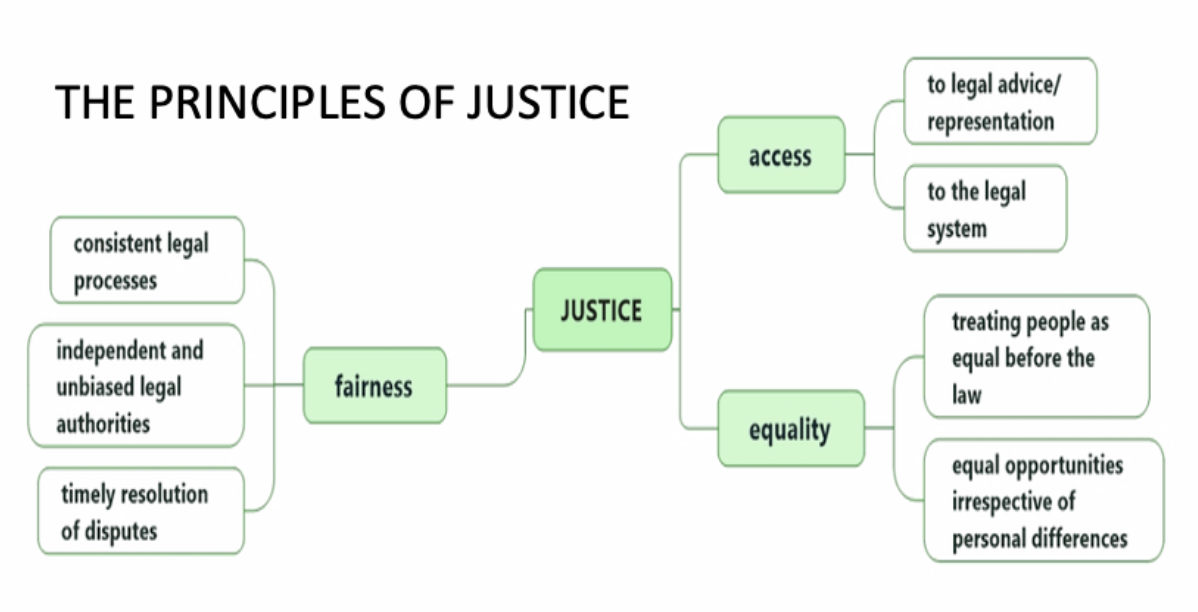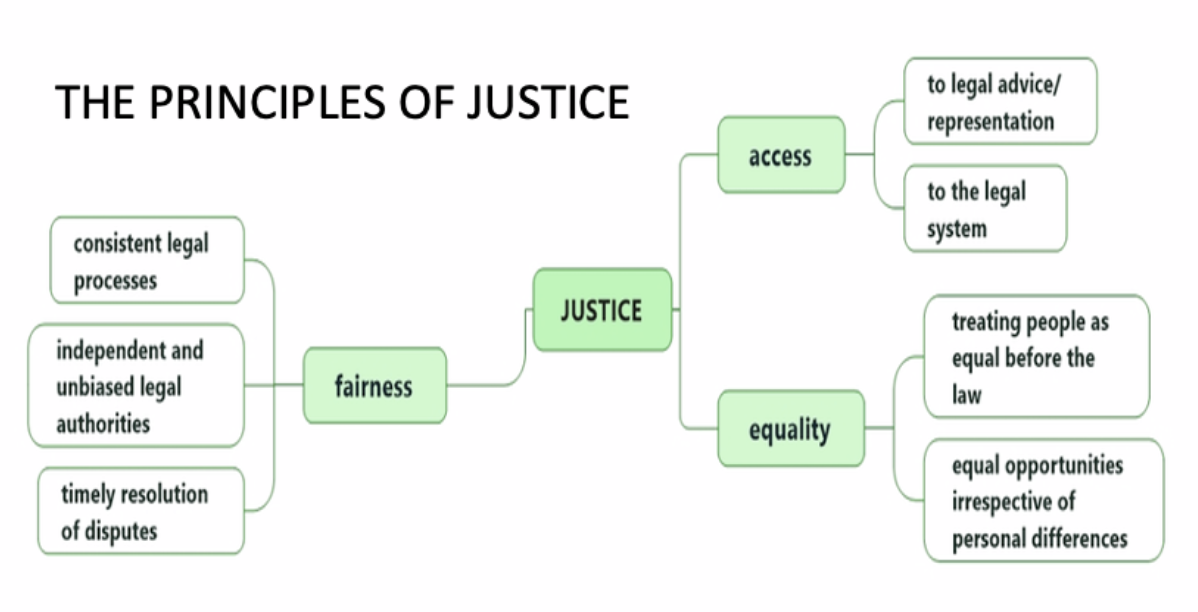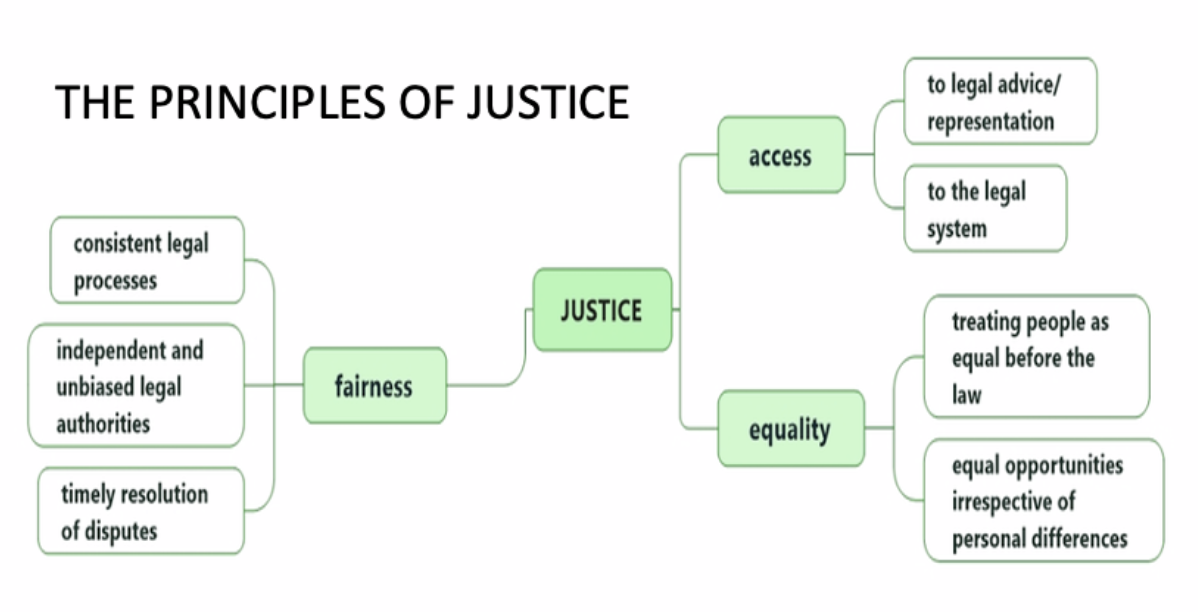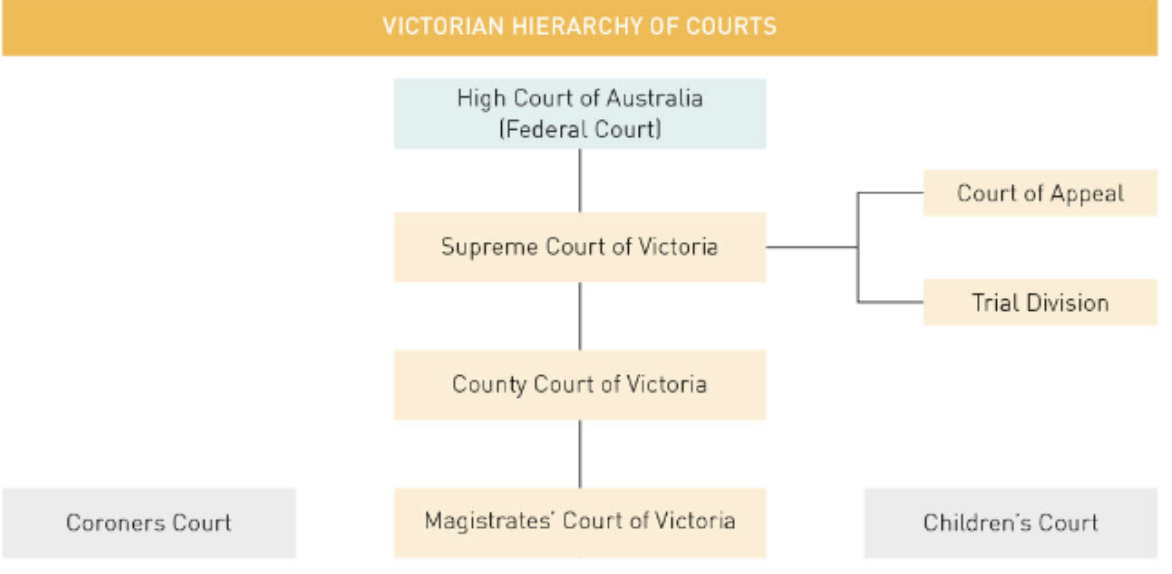Legal Studies | Unit 1 AOS1 (copy)
0.0(0)
Card Sorting
1/49
Earn XP
Description and Tags
Last updated 3:11 AM on 3/2/23
Name | Mastery | Learn | Test | Matching | Spaced | Call with Kai |
|---|
No analytics yet
Send a link to your students to track their progress
50 Terms
1
New cards
Equality (PoJ)
‘the state of being equal, especially in status, rights, or opportunities.’
\
E**veryone who comes before the courts is treated** ==**the same**== – __regardless of sex, gender, race, religion or culture.__
\
Laws should ==apply to everyone equally== w/ ==no exceptions or discrimination== that affects people ==based on their characteristics.==
\
E**veryone who comes before the courts is treated** ==**the same**== – __regardless of sex, gender, race, religion or culture.__
\
Laws should ==apply to everyone equally== w/ ==no exceptions or discrimination== that affects people ==based on their characteristics.==

2
New cards
Fairness (PoJ)
\
\
‘impartial and just treatment or behaviour without favouritism or discrimination.’
\
this means that ==one party is not allowed== an ==unequal advantage== over the other party. It means that ==severe penalties are given for severe crimes==, and ==lesser penalties for lesser crimes==.
Everybody is given an ==opportunity to present their case== ==fairly== and ==without discrimination==, with ==strict adherence== to rules of ==evidence and procedure.==
\
this means that ==one party is not allowed== an ==unequal advantage== over the other party. It means that ==severe penalties are given for severe crimes==, and ==lesser penalties for lesser crimes==.
Everybody is given an ==opportunity to present their case== ==fairly== and ==without discrimination==, with ==strict adherence== to rules of ==evidence and procedure.==

3
New cards
Access (PoJ)
means that everyone in the legal system is able to use the resources, procedures and institutions available throughout the legal system.
\
For laws, this means that they are ==freely known and people can access the laws themselves.==
\
Within the trial process, this means people affected by the legal system can ==access help and advice related to their case and circumstances.==
\
For laws, this means that they are ==freely known and people can access the laws themselves.==
\
Within the trial process, this means people affected by the legal system can ==access help and advice related to their case and circumstances.==

4
New cards
Factors affecting the ability of the criminal justice system to achieve the principles of justice.
==Cost factors -==
The ==cost of legal representation== means that people on ==lower incomes are unable to afford== the ==cost of a lawyer,== barring them from having their case heard in the best possible light before the court.
\
The ==lack of legal aid availability== is also a significant barrier in providing people with proper representation.
Where legal aid is unavailable, people who choose to ==self-represent in court also face many barriers== which come from the complex procedures and requirements of the court.
\
==Time factors -== Delays in the justice system may prevent principles of justice from being achieved.
\
==Cultural factors== - An individual's culture may significantly affect the ability of the court to achieve principles of justice.
The ==cost of legal representation== means that people on ==lower incomes are unable to afford== the ==cost of a lawyer,== barring them from having their case heard in the best possible light before the court.
\
The ==lack of legal aid availability== is also a significant barrier in providing people with proper representation.
Where legal aid is unavailable, people who choose to ==self-represent in court also face many barriers== which come from the complex procedures and requirements of the court.
\
==Time factors -== Delays in the justice system may prevent principles of justice from being achieved.
\
==Cultural factors== - An individual's culture may significantly affect the ability of the court to achieve principles of justice.
5
New cards
Explain what is meant by a court hierarchy
A court hierarchy is the organisation of courts in a hierarchical structures, with superior courts hearing more complex and serious cases, as well as appeals from lower courts.
6
New cards
Reasons for a court hierarchy
1. It enables a system of appeals to operate.
\
2. It allows superior courts to establish precedents that must be followed by lower courts.
\
3. It provides administrative convenience for the legal system.
\
4. It encourages the development of expertise in each level of the hierarchy.
7
New cards
Court hierarchy

8
New cards
Outline the role of the legal system in achieving social cohesion
Laws are ==fundamental to achieving social cohesion== and ==protecting the rights of individuals.==
\
They establish a framework in which people live, set boundaries for behaviour, and allow groups and individuals to make choices about how they live
\
They establish a framework in which people live, set boundaries for behaviour, and allow groups and individuals to make choices about how they live
9
New cards
Characteristics of an effective law
* **Reflect society’s values**
If a law’s in line with society’s current values, then people are more likely to follow that law than disregard it. Therefore, laws need to change when society’s values change
\
* **Be enforceable**
If people break the law, there must be punishments involved, it must be possible to catch them or sue them. If a law has no punishments/is not enforced people are less likely to abide by the laws.
\
* **Be known**
An effective law must be known, if people don’t know about the law, then they can’t follow it.
This goes both ways, it’s an individual’s responsibility to find out what the law is in a situation that affects them. However, law-makers also need to keep the public informed of any new laws being passed by parliament.
\n
* **Be clear and understood**
Laws must also be clear and understood in order to be effective, they should be written in a way so that anybody can understand it, and the intent of the law is clear. If laws were unclear or written in a language that nobody understood full of gibberish, then people won’t follow the laws.
\
* **Be stable**
If laws were constantly changing, then no one would ever be 100% certain on what the law is, resulting in the law becoming ineffective as people would not be able to follow the correct law. If a law has remained constant over a long period of time, then people are more likely to follow the law as the details have remained unchanged.
If a law’s in line with society’s current values, then people are more likely to follow that law than disregard it. Therefore, laws need to change when society’s values change
\
* **Be enforceable**
If people break the law, there must be punishments involved, it must be possible to catch them or sue them. If a law has no punishments/is not enforced people are less likely to abide by the laws.
\
* **Be known**
An effective law must be known, if people don’t know about the law, then they can’t follow it.
This goes both ways, it’s an individual’s responsibility to find out what the law is in a situation that affects them. However, law-makers also need to keep the public informed of any new laws being passed by parliament.
\n
* **Be clear and understood**
Laws must also be clear and understood in order to be effective, they should be written in a way so that anybody can understand it, and the intent of the law is clear. If laws were unclear or written in a language that nobody understood full of gibberish, then people won’t follow the laws.
\
* **Be stable**
If laws were constantly changing, then no one would ever be 100% certain on what the law is, resulting in the law becoming ineffective as people would not be able to follow the correct law. If a law has remained constant over a long period of time, then people are more likely to follow the law as the details have remained unchanged.
10
New cards
The structure of the Commonwealth Parliament
King
Queen’s representative (governor-general)
Lower house (house of reps)
upper house (senate)
Queen’s representative (governor-general)
Lower house (house of reps)
upper house (senate)
11
New cards
The structure of the Victorian Parliament
Queen’s representative (governor)
lower house (Legislative assembly)
upper house (Legislative council)
lower house (Legislative assembly)
upper house (Legislative council)
12
New cards
How does the role of the upper house differ from that of the lower house? (Commonwealth)
House of reps:
Represents the people, introduces and passes proposed laws (bills), review bills passed by senate and form the Australian government
\
Senate:
Represents the interests of states and territories of Australia, introduce and pass bills, and review bills passed by the HOR
Represents the people, introduces and passes proposed laws (bills), review bills passed by senate and form the Australian government
\
Senate:
Represents the interests of states and territories of Australia, introduce and pass bills, and review bills passed by the HOR
13
New cards
How does the role of the upper house differ from that of the lower house? (State)
Legislative assembly:
Main role is to introduce and pass bills and to form the Victorian Government
\
Legislative council:
Main role is to introduce and pass bills reviewed by the Legislative assembly.
Bills passed by the Legislative assembly can be rejected or amended by the Legislative council
Main role is to introduce and pass bills and to form the Victorian Government
\
Legislative council:
Main role is to introduce and pass bills reviewed by the Legislative assembly.
Bills passed by the Legislative assembly can be rejected or amended by the Legislative council
14
New cards
Identify the two sources of law in Australia.
**Statute law:**
* Parliaments make Legislations/Acts of Parliament
Australia’s parliamentary system is based on the concept of **supremacy** of **parliament**.
* This means that parliaments are able to override laws made by other bodies, **including the courts**, and the final law-making power is left to the government
\
\n
**Common law:**
* Law that is made by the courts
The court’s primary responsibility is to ==apply existing law==s to the facts in cases and to r==esolve disputes.==
\
However, the secondary role of the courts is to make laws as part of their determination of cases.
\
**They are able to make law in 2 situations/circumstances:**
* By **interpreting** the **meaning** of the **words** in a **statue** when applying the statue to a case the court is hearing (known as statutory interpretation)
* By deciding on a new issue that is brought before the court in a case where there is no legislation in this area or when a previous principle of law requires expansion to apply to a new situation
\
==ALSO !== Statutory authorities (eg. australia post, council)
* Parliaments make Legislations/Acts of Parliament
Australia’s parliamentary system is based on the concept of **supremacy** of **parliament**.
* This means that parliaments are able to override laws made by other bodies, **including the courts**, and the final law-making power is left to the government
\
\n
**Common law:**
* Law that is made by the courts
The court’s primary responsibility is to ==apply existing law==s to the facts in cases and to r==esolve disputes.==
\
However, the secondary role of the courts is to make laws as part of their determination of cases.
\
**They are able to make law in 2 situations/circumstances:**
* By **interpreting** the **meaning** of the **words** in a **statue** when applying the statue to a case the court is hearing (known as statutory interpretation)
* By deciding on a new issue that is brought before the court in a case where there is no legislation in this area or when a previous principle of law requires expansion to apply to a new situation
\
==ALSO !== Statutory authorities (eg. australia post, council)
15
New cards
doctrine of precedent
is the rule that a legal principle that has been established by a superior court should be followed in other similar cases by that court and other courts.
16
New cards
ratio decidendi
A Latin term meaning ‘the reason’:
the legal reasoning behind a judge’s decision. Ratio decidendi forms the binding part of a precedent.
the legal reasoning behind a judge’s decision. Ratio decidendi forms the binding part of a precedent.
17
New cards
obiter dictum
A Latin term meaning **'by the way';**
comments made by the judge in their ruling that are not part of the ratio and so, only have persuasive value
comments made by the judge in their ruling that are not part of the ratio and so, only have persuasive value
18
New cards
binding precedent
A precedent that is set by a higher court that must be followed (by lower authorities) in future cases.
19
New cards
persuasive precedent
A precedent set by a court of equal or lower status in the court hierarchy that is not binding, but may have some influence in a future case.
20
New cards
overruling
A superior court establishes a precedent that changes an existing precedent. (In two separate cases)
21
New cards
reversing
A precedent can be reversed when the same case is taken to a higher court on appeal. When a precedent is reversed, it no longer applies
22
New cards
distinguishing
If the material facts of a case are different from the material facts in a binding precedent, a lower court may not have to follow the precedent. Instead, they may distinguish the material facts in a present case from those in the previous case and make a different decision.
23
New cards
disapproving
Occurs when a judge expresses concerns about the precedent and although the precedent still must be followed, it weakens its authority.
24
New cards
**crime**
An act or omission that breaks an existing law, harmful to an individual or society as a whole and punishable by law.
25
New cards
civil wrong
A private dispute between two or more individuals involving a breach of rights that results in some form of loss.
26
New cards
prosecution
Representatives of the State who investigate a crime and argue the case against an accused in court.
27
New cards
plaintiff
The party in a civil dispute who initiates an action against another party because of an alleged breach of their rights.
28
New cards
defendant
The person/group of people who has been accused of committing a criminal act or civil wrong.
29
New cards
sanction
A penalty imposed by the courts when the defendant has been found guilty of an offence.
30
New cards
remedy
The outcome of a civil case that should restore the plaintiff to their original position -- usually in the form of financial compensation for loss suffered.
31
New cards
Statutory interpretation
Where courts take law from the parliament, as they are usually written in more general terms, to further clarify what is attempted to be interpreted. This interpretation sets a precedent for future cases
32
New cards
A statutory interpretation that established a precedent
Deing v Tarola
* man accused of possessing a weapon, with the weapon in question being a ==black belt with silver studded spikes==
* plead not guilty but the Magistrates found him guilty
* He then a==ppealed against this decision,== where the ==supreme court had to interpret== what a ‘regulated weapon’ was
* man accused of possessing a weapon, with the weapon in question being a ==black belt with silver studded spikes==
* plead not guilty but the Magistrates found him guilty
* He then a==ppealed against this decision,== where the ==supreme court had to interpret== what a ‘regulated weapon’ was
33
New cards
landmark cases
Involves a novel area of law, where no existing law is available for courts to apply, and so their ruling becomes the definitive legal principle on the matter.
\
outcome’s reason = ratio decidendi
\
outcome’s reason = ratio decidendi
34
New cards
What is the difference between codification and abrogation?
**Abrogation**
To cancel or abolish a precedent by passing an Act of Parliament
\
**Codification**
Is the opposite of abrogation, occurs when parliament passes law to put a precedent in legislative form, so that it becomes permanent
To cancel or abolish a precedent by passing an Act of Parliament
\
**Codification**
Is the opposite of abrogation, occurs when parliament passes law to put a precedent in legislative form, so that it becomes permanent
35
New cards
**Donoghue v Stevenson and Grant v Australian Knitting Mills. What were their shared material facts?**

36
New cards
House of reps
The lower house of the federal parliament where the government is formed because it holds a majority of seats.
37
New cards
Senate
The upper house of the federal parliament when scrutiny of legislation takes place. It is also known as the States' House as each state has equal representation in the chamber regardless of population.
38
New cards
Burden of proof in Criminal
Prosecution V the accused
Prosecution has burden of proof with the standard of proof being ==beyond reasonable doubt==
They need to prove that there is no other reasonable explanation other than that the accused is guilty
Prosecution has burden of proof with the standard of proof being ==beyond reasonable doubt==
They need to prove that there is no other reasonable explanation other than that the accused is guilty
39
New cards
Burden of proof in Civil
Plaintiff v Defendant
\
Plaintiff has the burden of proof where the standard of proof is the ==balance of probabilities==
\
meaning the plaintiff must prove that their story is more likely than the defendant’s story
\
Plaintiff has the burden of proof where the standard of proof is the ==balance of probabilities==
\
meaning the plaintiff must prove that their story is more likely than the defendant’s story
40
New cards
The relationship b etween parliamenbt and the courts
The courts and the Parliament provide checks and balances on each other, they have a complementary relationship.
* The parliament and the courts must work together to ensure that laws are workable and enforceable
* Courts prevent the Parliament from exceeding their constitutional powers
\
Statutory interpretation
Codification of common law
Abrogation of common law
Ability of courts to influence parliament
\n
* The parliament and the courts must work together to ensure that laws are workable and enforceable
* Courts prevent the Parliament from exceeding their constitutional powers
\
Statutory interpretation
Codification of common law
Abrogation of common law
Ability of courts to influence parliament
\n
41
New cards
Magistrate's Court OG JURISDICTION
Criminal
1. Summary Offences - less serious crimes such as jaywalking, shoplifting and traffic offences.
2. Indictable Offences Heard Summarily - where the accused opts to have their indictable offence heard by a Magistrate rather than a County Court judge (to hopefully incur a lesser penalty). NOTE: This is only available for a limited range of offences.
3. Committal Hearings - a Magistrate will assess the strength of the Prosecution's case to determine if there is sufficient evidence to support a conviction should it proceed to trial in the County or Supreme Court -- that is, does a prima facie case exist?
4. Bail Hearings - a Magistrate will decide whether or not an accused is permitted Bail or whether they will be remanded in custody until the hearing. This will be determined by factors such as -- are they a threat to society or do they pose a flight risk?
Civil - disputes where the plaintiff is seeking damages between the amounts of $10,000 to $100,000.
1. Summary Offences - less serious crimes such as jaywalking, shoplifting and traffic offences.
2. Indictable Offences Heard Summarily - where the accused opts to have their indictable offence heard by a Magistrate rather than a County Court judge (to hopefully incur a lesser penalty). NOTE: This is only available for a limited range of offences.
3. Committal Hearings - a Magistrate will assess the strength of the Prosecution's case to determine if there is sufficient evidence to support a conviction should it proceed to trial in the County or Supreme Court -- that is, does a prima facie case exist?
4. Bail Hearings - a Magistrate will decide whether or not an accused is permitted Bail or whether they will be remanded in custody until the hearing. This will be determined by factors such as -- are they a threat to society or do they pose a flight risk?
Civil - disputes where the plaintiff is seeking damages between the amounts of $10,000 to $100,000.
42
New cards
Children’s court OG jurisdiction
**Criminal -** trials where the accused was aged 17 or under when the offence was committed.
**Family -** disputes where children are seeking emancipation and other family matters.
**Family -** disputes where children are seeking emancipation and other family matters.
43
New cards
Coroner’s court OG jurisdiction
Investigations into deaths that are suspicious in nature, are the result of a fire or occur in a public place
44
New cards
County Court OG jurisdiction
Criminal - trials involving all indictable offences other than those pertaining to murder, treason or terrorism.
\
Civil - disputes involving claims for an unlimited amount of compensation as damages.
\
\
May hear Criminal appeals from the Magistrate's Court on conviction only.
\
No Civil appeals.
\
Civil - disputes involving claims for an unlimited amount of compensation as damages.
\
\
May hear Criminal appeals from the Magistrate's Court on conviction only.
\
No Civil appeals.
45
New cards
Supreme Court - trial division
Criminal - trials involving the most serious indictable offences such as murder, treason and terrorism.
\
May hear Criminal appeals from the Magistrate's Court on severity of sentence or **on point of law.** \n
\
Civil - disputes involving claims for an unlimited amount of compensation as damages.
\
May hear Civil appeals from the Magistrate's Court.
\
May hear Criminal appeals from the Magistrate's Court on severity of sentence or **on point of law.** \n
\
Civil - disputes involving claims for an unlimited amount of compensation as damages.
\
May hear Civil appeals from the Magistrate's Court.
46
New cards
Supreme Court - Court of Appeal
No original jurisdiction.
\
May hear Criminal and Civil appeals from the County Court or from the Trial Division of the Supreme Court.
\
May hear Criminal and Civil appeals from the County Court or from the Trial Division of the Supreme Court.
47
New cards
High Court
Disputes between various levels of government or between an individual and the government. This typically involve matters pertaining to the Constitution.
\
May hear appeals from the various State Courts of Appeal.
\
May hear appeals from the various State Courts of Appeal.
48
New cards
Example of fairness and equality
Koori court
* “not equal”
* because they are more disadvantaged and different cultural behaviours - i**t brings them in the same level as we are in the traditional court system**
* they don’t achieve a just outcome in a tradition court room
* “not equal”
* because they are more disadvantaged and different cultural behaviours - i**t brings them in the same level as we are in the traditional court system**
* they don’t achieve a just outcome in a tradition court room
49
New cards
An appeal from the Magistrates’ Court on point on law
Supreme court
50
New cards
state decisis
latin phrase meaning to stand by what has been decided
\
lower courts following the reasons for the decsiiison of the hgih coruts
\
lower courts following the reasons for the decsiiison of the hgih coruts